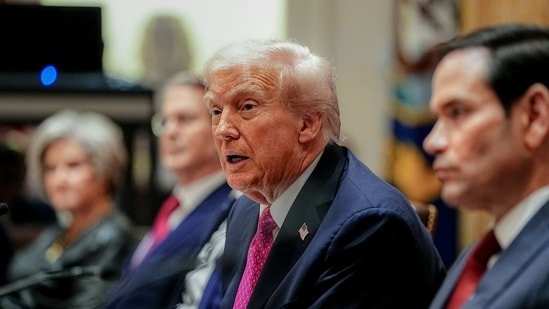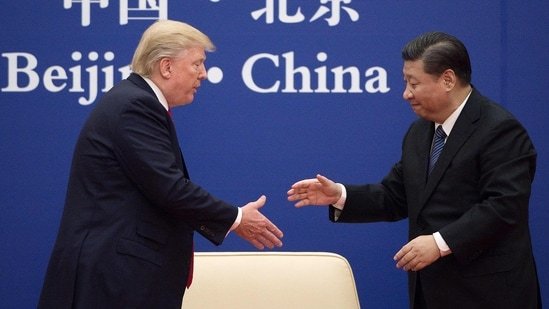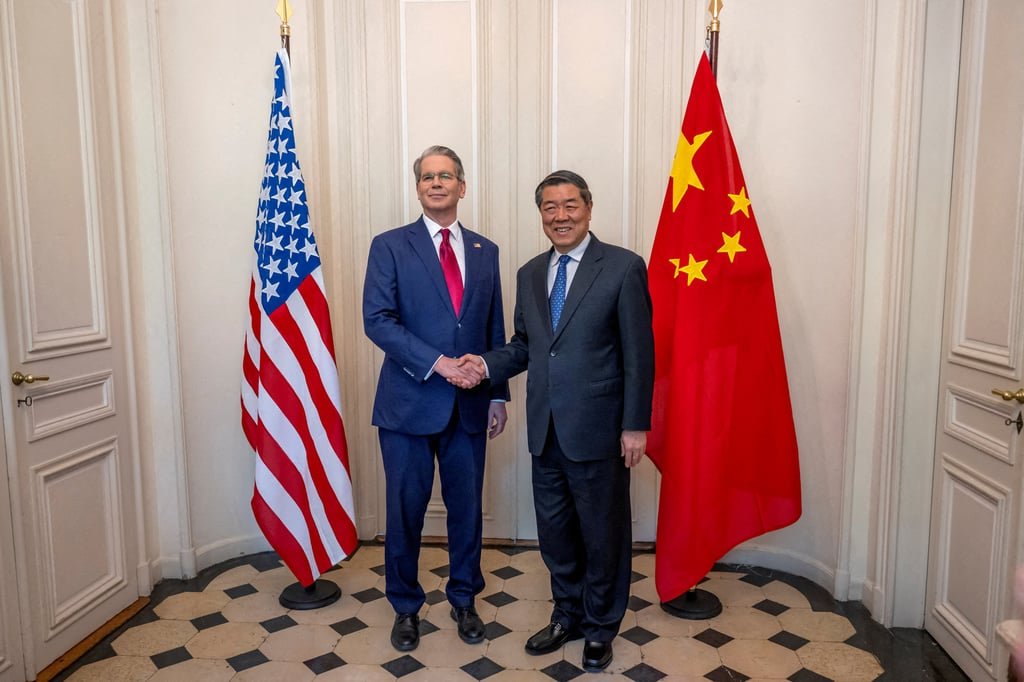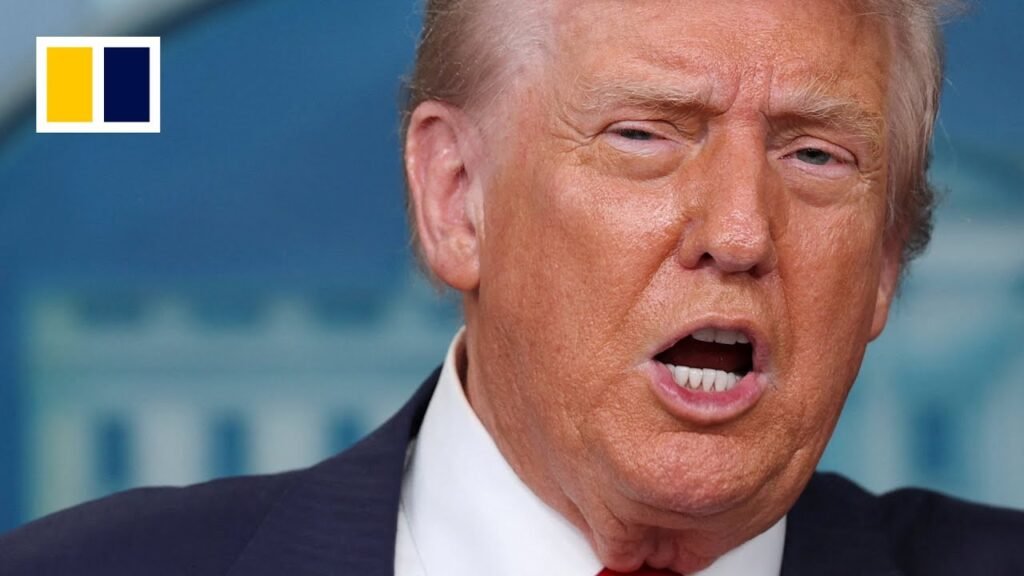Douglas FraserBusiness/economy editor, Scotland

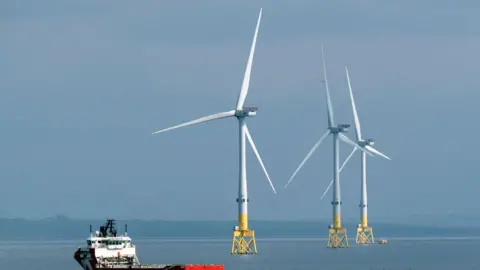 Getty Images
Getty ImagesAccepting the offer to build parts for wind turbines looks like a no-brainer.
About £1.5bn of investment, 1500 jobs – perhaps even double that – and at last, a sign that the renewables energy bonanza is going to offer some lasting benefit to Scottish manufacturing.
Any government – Westminster, Holyrood or Highland Council – would normally be delighted by the plan for a factory making turbine blades of more than 100m in length as well as nacelles, the gearboxes weighing hundreds of tonnes which sit atop turbine towers.
But this is not a normal offer. It comes from Ming Yang, one of the biggest industrial players in China’s rapid expansion of offshore wind, as that Asian giant has powered past the UK’s global lead.
The company wants to locate production somewhere it can service the European market.

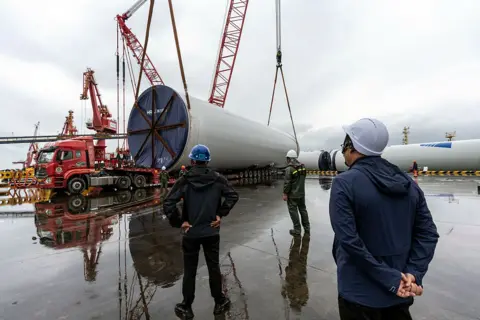 Getty Images
Getty ImagesArdersier, to the east of Inverness, is a strong contender and favoured option.
Under the ownership of a company set up to develop it, Haventus, it has 350 acres of space being developed with £400m of investment, to be ready for the boom in offshore renewables expected by the end of this decade.
That’s the area of roughly 180 football pitches. Ardersier is the biggest industrial facility of its kind in Europe. It is included in the boundaries of the Cromarty Firth and Inverness Green Freeport, meaning generous tax breaks to attract investment.
Around 100 acres is being prepared as lay-down space for equipment being assembled for float-out, so far most of it imported into the UK.
The remaining 250 acres requires manufacturing to make that investment viable, a large chunk of it publicly-funded. Ming Yang would take up most of that space.
Spy trial
That’s if it gets the go-ahead. The company put out an unusual announcement of its plans. Usually, it would be announced once the deal was done.
But the announcement made it clear that the hurdle it still has to clear is the UK government.
The Chinese industrial giant was choosing to put pressure on Whitehall ministers, so that everyone knows how big the investment could be and what they could jeopardise.
When it published the statement, late on Friday 10 October, it may have known some of what was to follow over the subsequent week, as UK politics became convulsed by one of the toughest questions facing Whitehall – of how to to handle China.
The collapse of a planned trial of two British citizens, one from Edinburgh, accused of spying for China, had lit the fuse in September for a row that was to blow up at Westminster.
Opposition figures were demanding to know why the Crown Prosecution Service had not received the co-operation of the UK government in providing a sufficiently strong witness statement about the risk China poses to national and economic security.
Three witness statements provided to the prosecutors were published this week, which went some way to explaining that, yes, China is a significant threat to UK interests and capable of a large-scale espionage operation.
Imperial powers
But they also highlighted the dilemma at the heart of a key element of UK foreign policy.
China is an important trading and investment partner. The UK has been courting China for decades as it became the world’s manufacturing powerhouse, and now emerges as a technological superpower.
UK ministers have pushed at the trade doors to boost British exports of luxury goods, from cars to whisky, and they want to do far more in the service sector.
But meanwhile, there’s a wariness, as China’s international clout has grown, and it has become ever more brazen in pursuing its national interest.
Maybe it helps to be a former imperial power in recognising the rise of a new one.
In much of the developing world, China’s Belt and Road initiative with developing nations has sought to ensure it has the raw materials, the growing markets and the dependent creditors with which to secure its economic interests and extend its influence.
With developing countries, it has come to dominate some areas of exported manufacturing such as solar power, as much as it dominates toy and electronics production. With Australia, it has played hardball in securing raw materials and energy.

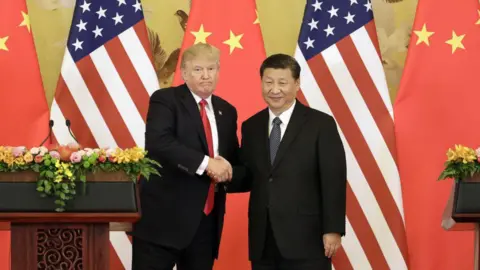 Getty Images
Getty ImagesIt has refused to let the US, under Donald Trump, dictate the terms of a new trading relationship, hitting back with tariffs at least as fiercely as the US president imposed them.
China has found a vulnerable spot in America’s trading game, by curtailing export and the use of rare earths, necessary for numerous manufacturing processes.
That is hitting the US’s closer allies too. China has the bulk of rare earth extraction, as well as the dirty processes of refining them, which other countries have been unwilling to host.
Software sabotage
This is similar to the way in which the US has used its technological lead to require other countries to curtail trade with China.
It banned the use of US technology in supply chains that involved the telecoms giant Huawei. Under Joe Biden’s presidency, which became increasingly negative about China, as did the US Congress, the UK’s manufacturers were among those forced to fall into line.
That is the outline of a complex and troubled trading relationship. The darker recesses of the relationship are also complex and wide-ranging.
In the most recent of the witness statements to the prosecutors of the now-collapsed spy trial, deputy National Security Adviser Matthew Collins said China is capable of carrying out large-scale espionage against the UK, and that China represents “the biggest state-based threat to the country’s economic security”.
Huawei’s presence in microchips and software within Britain’s computer systems and particularly its telecoms was seen as putting the UK under high vulnerability to surveillance, showing where people and their mobile devices are, and what they’re communicating, as well as offering ways of disabling them.
There are concerns that TikTok’s technology could do the same, bringing a bar on its use on government mobile phones.
Military research
One of the main attractions of the UK to China is its world-class university system. It attracts tens of thousands of Chinese students to study in the UK.
The dependence on Chinese fee income carries the threat of destabilising some institutions, including the more prestigious Scottish ones.

 Getty Images
Getty ImagesThe threat is more obvious in influence within universities, where Chinese money has funded Confucius Institutes as a focus for links. These are not only cultural, but in sensitive technology research.
Speaking to the BBC this week, Nigel Inkster of the International Institute for Strategic Studies and formerly with the spy agency MI6, there are “a lot of cases of joint research which have clear military-defence applications, where I would have thought it would occur to those engaged to ask questions about the desirability of continuing with such activities”.
His assessment is that the Chinese government will do whatever it takes, wherever it chooses, to protect its national interests.
He argues that the ideology behind Beijing’s Communist Party rule means that paranoia about threats to its political dominance is hardwired and drives it to extensive surveillance.
Steely sabotage
A different threat emerged earlier this year with the Chinese owners of the Scunthorpe steel works, apparently running down supplies to blast furnaces close to the point where they could not be re-started.
That brought MPs scurrying back to Westminster on a very rare Saturday sitting. They passed emergency legislation which effectively took control of the plant out of Chinese hands, asserting its importance as a strategic industrial asset that needs to be protected.
Without it, Britain would become more dependent on imported steel, with Chinese steelmakers eager to sell Britain its lower-priced surplus.

 Getty Images
Getty ImagesA decision made to close Grangemouth oil refinery earlier this year was taken by a company half-owned by PetroChina.
If there were strategic concerns raised within government, we didn’t hear them at the time. Instead, Petroineos was allowed to shut it down, and the government’s role was to put money into the transition of skills and the Forth Valley site for new sources of energy.
And that brings us back to Ming Yang – not a state-owned firm, but all such private companies are subject to the requirement that they act in the Chinese government’s interests.
The threat of mass surveillance, as with Huawei, is hardly matched by the building of turbine blades on the coast of the Moray Firth.
So why might that £1.5bn investment cause concern to UK authorities, including the security services? Is it any worse than the 16-year Chinese ownership of a cashmere-spinning firm near Kinross?
Self-destruct
One reason is in industrial policy – the risk that cheaper Chinese production of turbines could undermine the growth of rival companies and countries, and grab a worryingly high share of the market. And turbine manufacture makes use of rare earths.
That has been happening with electric vehicles. BYD vehicles claimed more than one in 30 UK car sales last month, almost ten times more than September last year.
When Alexander Dennis announced closure of its Falkirk bus-building plant earlier this year, it cited the competition from China, taking the country’s share of UK bus sales from a tenth to more than a third within only two years.
The other threat is in the software through which wind turbines are controlled, and the software which connects wind farms to the National Grid.
It is possible, and not seen by China and energy experts as far-fetched, that software code could be inserted that gives the manufacturer the ability to disable the turbines.
One specialist suggested that interference in those turbine controls could put such strains on the structures in very high winds that they could destroy themselves. And as the mainstay of Britain’s power production, that would be a vital economic asset at risk of compromise.
‘The Tinder of energy’
A less dramatic inroad into the British energy system could be achieved through a new partnership between Ming Yang and Octopus Energy, biggest retailer of energy to British households and with a presence in six other retail markets.
Their recently-signed Memorandum of Understanding begins to explore ways in which the two companies could collaborate.

 Getty Images
Getty ImagesOctopus wants to cut household bills. It’s investing in a rapid expansion of renewable power.
It has an innovative way of identifying places to build onshore turbines. ‘Winder’ is an app described as ‘the Tinder of energy’ – matching communities where people want a local supply of green energy with those who want to develop wind farms.
Ming Yang could be the supplier of the equipment, at lower prices than current suppliers, though Octopus insists the relationship would not be exclusive.
High-level, high-stakes
The Ming Yang factory planned for Ardersier looks focussed instead on offshore wind farms, and particularly floating turbines.
Asked about the powers to block that plan, the UK government’s business department issued a terse two-sentence reply:
“This is one of a number of companies that wants to invest in the UK. Any decisions made will be consistent with our national security.”
It’s rare that the Scottish government misses an opportunity to call for more powers.
In this case, perhaps it can see the dilemma it too would face, when a spokesman says: “We recognise that Ming Yang’s investment is subject to a decision from the UK government and look forward to the outcome of that process.”

 PA Media
PA MediaSo what would be consistent with “our national security”? How does the UK government balance such concerns with the eagerness to attract foreign investment?
It won’t say. Asked this week what the government’s position on China is, Dame Emily Thornberry, Labour chair of the Commons foreign affairs committee, said that she does not know because the government won’t say.
Both Conservative and Labour ministers have avoided spelling out the dilemma because of the risk of causing offence in China and sparking a hostile response from Beijing.
For that reason, a vital piece of Scotland’s energy transition hangs in the balance, at the mercy of high-level and high-stakes geopolitics.

